39 and Fighting: Yamicka Brown's Battle Back From Stroke
May 1, 2025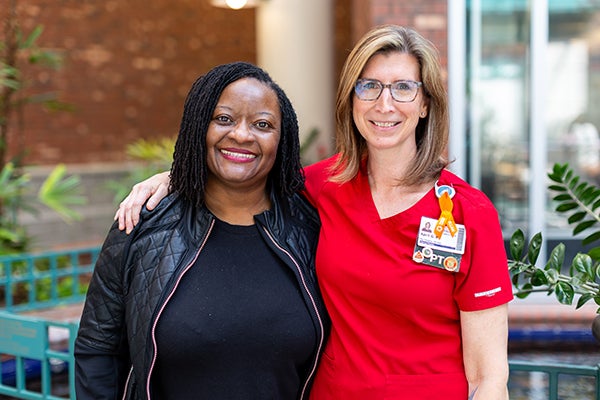
By: WakeMed Rehab & Physical Therapy
Categories: Raleigh Campus, Physical Therapy, Stories, Foundation, Women's
Tags: stroke, Ischemic Stroke
Stroke can happen any moment at any age to anyone.
For 39-year-old, energetic and physically active Yamicka Brown, the horrors of stroke took her completely by surprise.
A Fun Night Out Turns Into Midnight's Betrayal
Yamicka was driving home the evening of April 11, 2018, chatting on the phone with her sister, Latasha, after a fun night out with friends. Once she arrived home around 11 pm, she told her sister she'd call back later. Yamicka went inside her apartment and entered her bedroom, placing her phone on the bed. She then undressed for a shower.
"I got into the shower, and I lost the sensation of the bar of soap in my left hand as my left arm went numb," explains Yamicka. "Concerned by the numbness, I decided to get out of the shower."
With water still beading on her skin from her brief shower, Yamicka headed to her bedroom. Halfway there, she suddenly crumpled to the floor, landing hard beside the bed. Pain exploded in her head, triggering a violent wave of vomiting — followed by a blackout. The next several hours were a brutal repetition of waking, wracking head pain, vomiting and losing consciousness.
"I was in and out of it," shares Yamicka. "My face was literally lying in my throw up because I kept passing out, waking up, throwing up and passing out all night long."
A Quick-Thinking Supervisor Sends Help
In the morning, Yamicka noticed sunlight peeking through her curtains. Concerned she should have been at work by that time, she reached onto her bed with her right arm and began thrashing around using her right hand to locate the phone. Unable to grasp it, she then began pulling the covers off her bed, hoping the phone would slide down.
Yamicka recalls, "My phone fell to the floor, so I called my supervisor. He noticed my slurred speech, calmly asked me to hold on and then immediately called emergency medical services (EMS) to go to my home for a wellness check."
Once Yamicka's supervisor reconnected with her, she told him she was not able to get up, so she wasn't sure she would be able to open the door. He assured her that they would find a way to come to her aid.
Desperate, Yamicka bear crawled to her front door, using her right side to propel her body forward, her head still throbbing from pain.
First Responders Persist Despite Obstacles to Deliver Lifesaving Care
Once EMS workers arrived, they knocked for access, but Yamicka could not lift to open the door, so the EMS team contacted the police department to break into the home.
"The police broke the door open," remembers Yamicka, "and I was embarrassed as they found me on the floor, naked, covered in vomit and unable to stand."
Seeing Yamicka's condition, EMS workers immediately covered her in a tarp, rolled her onto her back, loaded her on a stretcher and carefully carried her down the outside stairs of her home to transport her to the nearest emergency room in her area.
Once she was in the ambulance, the EMS worker asked her to say, "You can't teach an old dog new tricks."
Upon hearing her repeat it, he heard her slurred speech and prepared the medical team for a possible incoming stroke patient. Recognizing the urgency of Yamicka's care needs, this hospital immediately prepared her for transport to another hospital where she could more quickly receive advanced diagnostic testing and care.
Latasha reflects, "It was a scary time. Our family lived three hours away, so a friend who was only 45 minutes away spent a lot of time with Yamicka in the hospital. Once I was was able to get there, I noticed her mobility on her left side had grown worse, and she was blurting out words that didn't make any sense. She seemed to be hallucinating. We were all very afraid and asked the doctor if she would be okay."
Yamicka was diagnosed with an ischemic stroke, and the medical team performed a surgical procedure to remove the blood clot in her brain.
A Journey Back to Life with WakeMed Rehabilitation Hospital
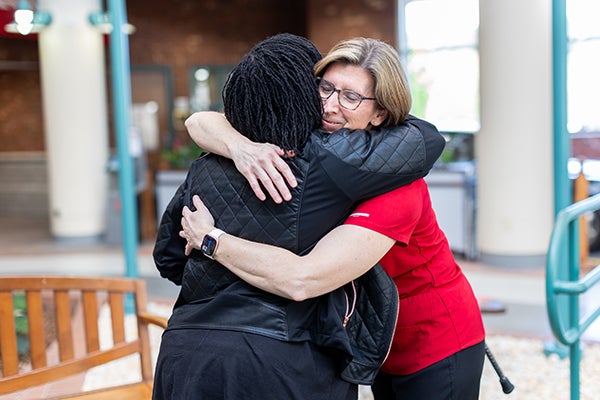
"I was there through April 18, 2018, at which time I was discharged and transferred to WakeMed Rehabilitation Hospital — at the request of my family since they all resided in the Raleigh area," notes Yamicka.
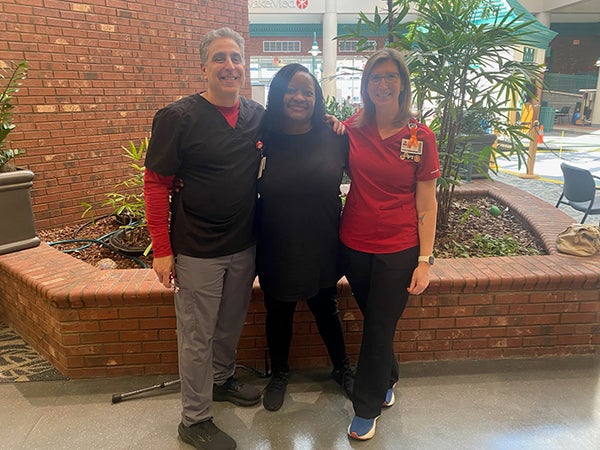
Yamicka remained at WakeMed until June 25, 2018, under the care of physical medicine and rehabilitation physician Patrick O'Brien, MD. She received physical, occupational, recreational and speech therapy each day. Yamicka was also given tools to help her navigate life with left-side paralysis and cognitive decline.
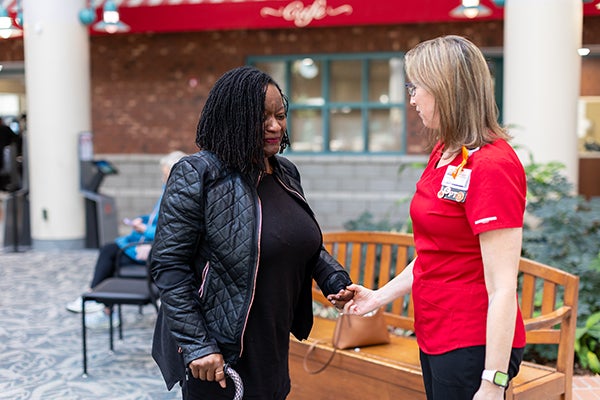
"April Gallons was the therapist who made an impact on me. I didn't want to go to therapy. I wanted to go home. I didn't want to be bothered with anyone. One day, care team members came to take a blood sample, and I lost it. I told them I was sick of them and that I would not give blood. They had to call Latasha, so she could talk me into it. Mentally, everything was taxing. Yet, therapist April was kind, yet stern — in a good way. One day, I was complaining to her, and April said, 'My dad always told me complain, but at the end of the day, do what needs to be done.' That statement had a major impact on me, and, thereafter, I did whatever anyone asked despite not feeling like it."
Home, Hope and Healing Through Help
On the day Yamicka was discharged into the care of her sister, she was excited.
April Gallons felt privileged to have provided therapeutic intervention for Yamicka, a patient who had made a welcome comeback from a harrowing ordeal and one she would never forget.
Gallons says, "Physical, occupational, speech and recreational therapy play a vital part in the recovery of a patient who has had a stroke. Our goal at WakeMed in inpatient rehab is to empower patients to regain their independence and improve their quality of life, fostering hope and resilience every step of the way. Yamicka experienced a life-changing event, but through sheer determination and hard work, she achieved remarkable progress. I am incredibly proud of her and grateful to have been a part of her journey to recovery."
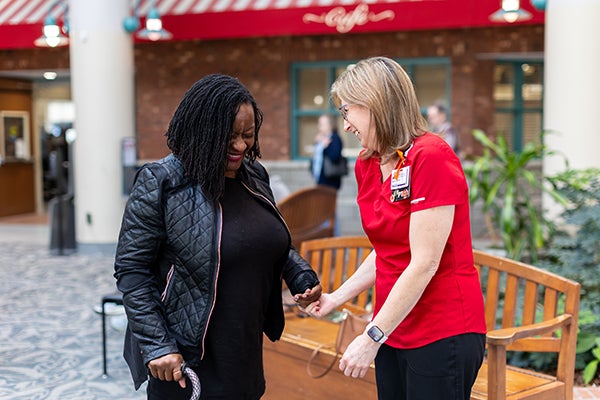
She went home in a wheelchair and then moved up to a four-point walker, then a two-point walker and finally a cane.
"I did not realize being home was going to be the hardest part," Yamicka says, "and it had nothing to do with my sister and her family. It was the fact that I didn't have any ability to do too much of anything. I couldn't use my left hand or arm."
Latasha cared for her sister, two toddlers and her husband to the best of her ability. Thankfully, WakeMed sent home health aids each morning for the next several weeks to help Yamicka get dressed. From there, Latasha was responsible for making meals and transporting Yamicka three days per week to outpatient rehab where she received physical and aqua therapy at WakeMed Outpatient Rehabilitation - Raleigh.
Latasha shares, "It was so hard. I don't know how I did it. I had two very young children, and caring for my sister was like having a third child. Plus, my husband needed me. Yet, somehow I managed to do it all — from transporting Yamicka back and forth to therapy — to making meals — to cleaning — to providing snacks to my sister who needed to eat about every two hours to stave off headaches. And, once my children entered school, Yamicka did what she could to help care for them.
Yamicka's Life Today
Today, Yamicka is leading a fairly normal life. She works a full-time job and has moved into a house with another sister.
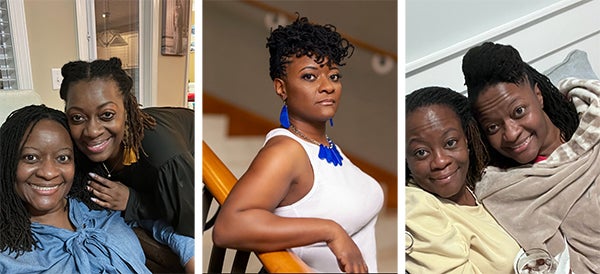
Of her life today, Yamicka observes, "I am grateful for WakeMed and for where I am in my recovery. I owe thanks and praise to God; my best friend, Rashaun; and my family — my support system and my cheerleaders. Yet, I miss the old me. While I'm much better, I still don't have full function of my left hand, and I walk without a cane, but it's easier for me to fall. I also have challenges with processing information and communicating. As for my mental health, I now struggle with bouts of depression. It has been a journey and continues to be a journey."
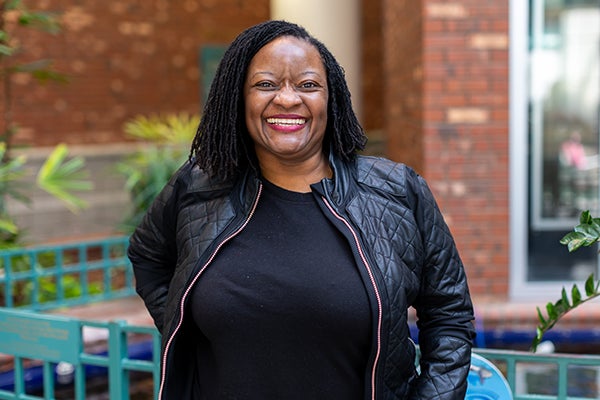
The Unknown Whys of Stroke
Reflecting on possible causes of the stroke at such a young age, Yamicka worked one full-time and two part-time jobs prior to her stroke. She also had been diagnosed with high cholesterol and had ceased with medication as she'd been working out to get healthy and in shape. Additionally, she was on birth control pills and was among the one percent of users who suffered with chronic blood clots with usage. Her sisters believe that stress from such an active lifestyle as well as issues with chronic blood clots while on birth control may have contributed to her stroke. Physicians did not pinpoint an exact reason but have considered Yamicka's lifestyle, health and medication as potential causations.
Yamicka explains, "Right before my stroke, I was having some stress from my full-time job, and I was in the process of looking for another one. I had a very active lifestyle and worked out seven days a week, so I was able to come off of my cholesterol medication."
Sometimes, a stroke occurs and despite thorough investigations, doctors are unable to determine a specific cause. This is often referred to as a cryptogenic stroke. This can be frustrating for both patients and medical professionals, as understanding the cause is crucial for tailoring secondary prevention strategies. While no single, definitive reason is identified, potential underlying factors might include undetected heart abnormalities, paradoxical emboli (where a blood clot travels from the venous to the arterial circulation through an undetected opening in the heart) or subtle clotting disorders that are difficult to diagnose. Further research is ongoing to better understand these unexplained strokes and develop more effective diagnostic and preventative measures.
About WakeMed Physical Therapy
It’s our goal at WakeMed Physical Therapy to get you back to your active lifestyle. Our techniques are based on national best practices to ensure you receive the latest, best treatment for your condition. We provide physical therapy and occupational therapy in Raleigh, Cary, the Brier Creek area and Apex, North Carolina.
About WakeMed Rehabilitation Hospital
The WakeMed Rehabilitation team of accomplished professionals specialize in treating adults and children who have experienced a stroke, brain injury, spinal cord injury, orthopaedic issue, trauma, or limb loss through CARF-accredited programs. They share your goal: to regain as much independence and mobility as possible. They use the latest rehab techniques and technology and educate both patients and their family members to restore quality of life. Our medical directors also maintain lifelong relationships with patients to ensure their needs are met as they age. The WakeMed Rehabilitation Hospital, a 73-bed nationally recognized rehabilitation hospital, is located in Raleigh, NC and serves patients throughout the southeastern United States. Please call us at 919-350-7876 to speak with an Admissions representative or to schedule a tour.
About the WakeMed Stroke Program
Our Stroke Program is distinct in providing a comprehensive approach, moving from prevention to management. Our dedicated team of specialists, renowned for their expertise, use physical medicine and rehabilitative techniques at strategic steps along the route to recovery to support the best outcomes. Here are just a few of our impressive features as a thrombectomy-capable stroke center:
- Collaboration with EMS providers to facilitate rapid assessment and transport to the hospital
- Team approach that helps minimize time from arrival to administration of thrombolytics
- Availability of neuroradiologists for quick, expert interpretation of imaging
- Neurology and neurosurgery coverage 24 hours a day, seven days a week for evaluation and treatment
- Neuro intensive care unit for optimization of care for patients with severe strokes
- Nursing staff skilled in assessment and care of stroke patients
- Designated nursing unit for the care of patients with neurological and neurosurgical diagnoses
- Interdisciplinary care planning involving physicians, nurses, case managers, therapists and other services, such as nutritionist consultation and pastoral care
- Comprehensive post-discharge rehabilitation services, including specialty services, such as vestibular rehab to treat dizziness and vertigo
- Public education and awareness programs that focus on risk factor reduction for stroke prevention
- A variety of stroke support groups at several locations throughout North Carolina.